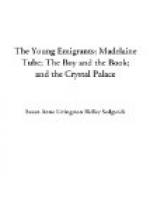At times, too, it would happen that he had something given him to read to the monks, which interested him very much; some portion of the history of a saint, perhaps, or a curious legend, so that no trouble was too great in deciphering the crabbed writing, provided that he could only get to the end of it, and make out all the sense; and he would carry home the story in his head, and entertain his mother with it over their evening meal. Then all this time, too, was he busy carving with his knife, out of the hardest wood he could find, a stock of letters, with which, when an occasion offered, he meant to make trial of imprinting whole sentences with ink. He did this secretly. He feared to vex his mother, and run the risk of his letters being burned as before, and he feared, too, that some one might find out his plan, and make use of it before he was ready prepared to show it as his own.
All this kept him silent and reserved, and he nourished within his mind many thoughts and hopes that no one knew of or suspected. To his mother he was ever kind and good, and as of old, he would in all his leisure hours gladly help her in her little household affairs, and in the preparation of her dye, and while doing the latter, he would also make trial of different kinds of ink that might be better for his letter imprinting than the thin ink used by the copyist. He saw that a thicker and more sticky kind of ink would be wanting for this purpose, and he endeavored to find some substance that would produce this stickiness and thickness. And thus was he ever preparing himself for the time when he could bring everything to bear on the great plan which he cherished in his mind; and in the meanwhile he grew up to be a man.
No longer a boy, at the age of eighteen Hans had not only learned to read and write well his native language, but had also learned the Latin tongue, which it was at that time quite necessary for him to know, seeing that many of the books then written were in that language. He came to be looked upon as a most learned youth, and the monks who had taught him, thinking that he would be a credit to their convent, were anxious that he should join them and become a monk like themselves, devoting the rest of his life to copying manuscripts and writing books. But this would not have suited at all with the purpose of Hans, and he knew that he could be much more useful when out in the world than shut up all his life writing in the convent. It grieved him to disappoint his good uncle, who had always hoped that he would become a monk, but he knew that he was right in refusing, and this made him strong and firm.




